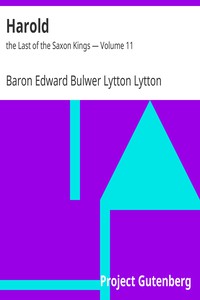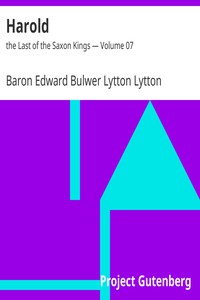Harold : the Last of the Saxon Kings — Complete by Lytton (good books for 8th graders .TXT) 📗

- Author: Lytton
Book online «Harold : the Last of the Saxon Kings — Complete by Lytton (good books for 8th graders .TXT) 📗». Author Lytton
123 (return)
AILRED de Vit. Edw.
124 (return)
Dunwich, now swallowed up by the sea.—Hostile element to the house of Godwin.
125 (return)
Windsor.
126 (return)
The chronicler, however, laments that the household ties, formerly so strong with the Anglo-Saxon, had been much weakened in the age prior to the Conquest.
127 (return)
Some authorities state Winchester as the scene of these memorable festivities. Old Windsor Castle is supposed by Mr. Lysons to have occupied the site of a farm of Mr. Isherwood’s surrounded by a moat, about two miles distant from New Windsor. He conjectures that it was still occasionally inhabited by the Norman kings till 1110. The ville surrounding it only contained ninety-five houses, paying gabel-tax, in the Norman survey.
128 (return)
AILRED, de Vit. Edward. Confess.
129 (return)
“Is it astonishing,” asked the people (referring to Edward’s preference of the Normans), “that the author and support of Edward’s reign should be indignant at seeing new men from a foreign nation raised above him, and yet never does he utter one harsh word to the man whom he himself created king?”—HAZLITT’s THIERRY, vol. i. p. 126.
This is the English account (versus the Norman). There can be little doubt that it is the true one.
130 (return)
Henry of Huntingdon, etc.
131 (return)
Henry of Huntingdon; Bromt. Chron., etc.
132 (return)
Hoveden.
133 (return)
The origin of the word leach (physician), which has puzzled some inquirers, is from lids or leac, a body. Leich is the old Saxon word for surgeon.
134 (return)
Sharon Turner, vol. i. p. 472.
135 (return)
Fosbrooke.
136 (return)
Aegir, the Scandinavian god of the ocean. Not one of the Aser, or Asas (the celestial race), but sprung from the giants. Ran or Rana, his wife, a more malignant character, who caused shipwrecks, and drew to herself, by a net, all that fell into the sea. The offspring of this marriage were nine daughters, who became the Billows, the Currents, and the Storms.
137 (return)
Frilla, the Danish word for a lady who, often with the wife’s consent, was added to the domestic circle by the husband. The word is here used by Hilda in a general sense of reproach. Both marriage and concubinage were common amongst the Anglo-Saxon priesthood, despite the unheeded canons; and so, indeed, they were with the French clergy.
138 (return)
Hilda, not only as a heathen, but as a Dane, would be no favourer of monks; they were unknown in Denmark at that time, and the Danes held them in odium.—Ord Vital., lib. vii.
139 (return)
Chron. Knyghton.
140 (return)
Weyd-month. Meadow month, June.
141 (return)
Cumen-hus. Tavern.
142 (return)
Fitzstephen.
143 (return)
William of Malmesbury speaks with just indignation of the Anglo-Saxon custom of selling female servants, either to public prostitution, or foreign slavery.
144 (return)
It will be remembered that Algar governed Wessex, which principality included Kent, during the year of Godwin’s outlawry.





Comments (0)